Our readers – the unsung heroes
9th April, 2018
Do you ever wonder how the Walter Scott Prize chooses its longlists? Every year we receive over one hundred entries for the Prize, and we also ‘call books in’ from publishers, based on recommendations from our judges who keep a beady eye on reviews and bookshops throughout the year.
So who sifts through all the books to find the hidden gems and to rate the contenders, before they go through to the Judges and our Academy list? Step forward our band of expert Readers, who work tirelessly throughout the year reading and thoughtfully appraising each and every book received.
Our Readers come from all walks of life and are spread across the UK – we’ve had reading teams as far apart as Shetland and Dorset. They are voracious readers with an interest in real people’s history and an eye for what might become a future classic. Over the years, the Readers have been responsible for picking out many titles that might otherwise have been overlooked, playing a vital part in the success of the prize. Motivated purely by their enjoyment of the books, they are our unsung heroes!
We thought you might like to see some of the things our Readers said about this year’s longlist and Academy Recommends books. Their salty summaries and insightful comments make great reading in themselves!
The Wardrobe Mistress by Patrick McGrath 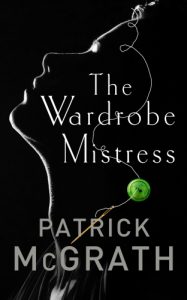
“This was quite simply brilliant story telling. I loved the atmosphere of post war London, gloomy, depressing, cold and worn down after years of war and deprivation. Most books focus on the war itself but I found the description of the struggle of people’s lives despite the war having ended really interesting.
I also enjoyed the attitude of the ‘narrator’ – the chorus composed of waspish, witty thespians. There was too the grubby yet menacing fascist movement, the backdrop of a production of The Duchess of Malfi all tied in with a wonderful study of grief and some truly original memorable characters.”
The Draughtsman by Robert Lautner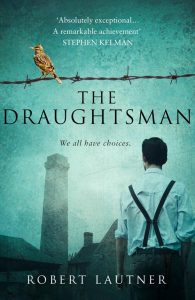
“The novel tells the story of Ernst Beck, who after months of unemployment finds a job working for a prominent engineering firm, in their Special Ovens Department. His job is to annotate plans for new crematoria which will burn day and night, allowing the SS to burn many thousands of bodies daily whilst saving fuel, as the burning bodies provide the fuel to burn others. At first he seems unaware of the reality of what he is doing, but even as the truth dawns on him he hides from it. The ensuing events make for uncomfortable reading, but this is never sensationalist, just told in uncompromising language which lays bare the dying days of Nazi Germany and the despair of those caught up in it as they are torn between self interest and the horrors associated of colluding in the deaths of thousands.
Even the minor characters come alive as they dance around each other in a world which is never safe for anyone. There are some wonderful, disturbing scenes, in a book which manages to balance historical fact with fictional characters caught up in events which a generation later seem hard to comprehend. The book had me by the throat and I couldn’t put it down. I thought I knew the holocaust, but this book will stay with me for a long time.”
Grace by Paul Lynch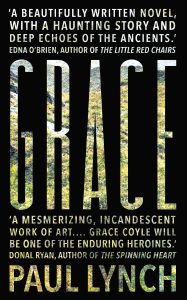
“The book is a sustained, vivid imagining of the fate of one young woman during the height of the potato famine in Ireland. The writing is exquisite in its capturing of the microscopic changes of mood, thought and experience of the characters as the little they have is reduced and reduced. Emotionally, it feels very real as Grace responds to the unfolding trauma by dissociating, flitting between inner voices. A tough read, however the vitality and resilience of the writing makes it consistently compelling. Poignant themes such as the main character’s blossoming womanhood cut short and denied like the potato harvest hold the whole thing together. The need for Grace to take on another identity in order to survive and then rebirth as a more whole and authentic individual was also a very satisfying theme. It really illustrates the indefatigability of nature.
The novel is a great piece of historical fiction, bringing to life the relentless privations of the people caught up in the famine. I feel engaged with that period of history now in a way I never have before.”
Amah and the Silk Winged Pigeons by Jocelyn Nullity (Academy Recommends)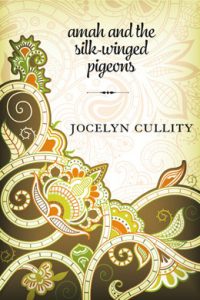
“A great novel set in mid-19th century India, dramatizing the period when the Indian population resisted British rule in Lucknow. It’s told through the eyes of a young woman of African descent who is part of the female military corps guarding Lucknow’s royalty. She witnesses the brutal and ignorant wiping away of Indian culture, heritage and power. Yet, it’s written on a small scale – e.g. we see the botched killing of an aging elephant with no care as to its suffering – and this seems to make the destruction all the more painful to bear and engrossing as a reader. The pace is slow as the main characters are held in a prolonged period of powerless waiting whilst they have to stand by mutely watching the defilement of their way of life. However, I think this adds realism, making the violence which follows inevitable. The period and Indian culture is vividly depicted, warmly and seductively through the tastes, sounds and smells. ”
My Beautiful Imperial by Rhiannon Lewis (Academy Recommends)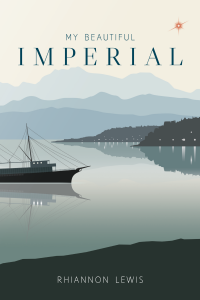
“A mighty read this, I feel bereft now that I’ve finished it, always a sign of a writer who can fascinate and engross the reader over 500 pages or so. This novel has at its heart the Chilean civil war – who knew? Not me. It is also inspired by the life and exploits of the author’s great great uncle, a Welsh lad who ran away to sea and became the captain of a steamship carrying mail and cargo up and down the Chilean coast in the latter years of the 19th Century.
Forced to turn his ship over to the government side in the insurrection he then carried troops and ammunition, facing all the usual moral quandaries of loyalty and betrayal amongst his colleagues and shipmates as well as the horrors of engagement. Other strands of the story are deftly woven in to the complex tapestry of events and provide richness and increased understanding of the pressures involved. Parliamentary questions are asked about the danger to British commercial interests in Chilean minerals and an English journalist dispatched by The Times to report on the rebellion finds that the ‘facts’ required by his editor do not match up to the facts he finds on the ground in Valparaiso.
I found this a totally satisfying novel, full of history told with a light hand and with the spark of adventure, with credible characters and a sure touch with the setting of an important Chilean port in the late 1800s. A cracker!”
Miss Boston and Miss Hargreaves by Rachel Malik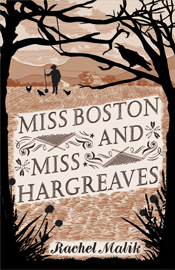
“It seems very fitting in 2018, the centenary of women getting the vote, to read this novel. This is a book about a deep friendship between two women who worked the land, set from 1940 -1960’s. Historically we are reminded of all the thousands of spinsters left after two world wars, their limited lonely hard lives. But what is charming and heartfelt in this quiet novel is that, yes, their lives are hard but these women derived great contentment from their ‘little’ lives despite hard physical work, poor accommodations, uncertain employment, and short funds. These women found joy in each other’s company and shared lives and asked for so little. This is a beautifully written low-key novel which could be missed but I have to defend it as being the novel this year for me which will live long in my memory and which has touched me emotionally in a way that none of the other fine books have.”

